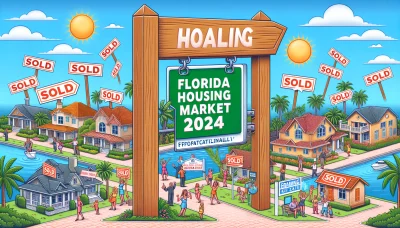Guide to FHA loans Quiz
Test Your Knowledge
Question of
Understanding FHA Loans
What is an FHA Loan?
An FHA loan is a mortgage insured by the Federal Housing Administration, designed to help lower-income borrowers secure a home loan. These loans are popular due to their lower down payment requirements and more lenient lending standards.
FHA loans are not issued by the government but are insured by it, which protects lenders against defaults. This makes them less risky for lenders and allows them to offer loans to a broader range of applicants.
The Basics of FHA Financing
FHA loans require a smaller down payment compared to conventional loans, often as low as 3.5% of the purchase price. This opens the door for homeownership to many who would otherwise be unable to afford it.
These loans come with certain restrictions, such as loan limits that vary by region and the requirement that the home being purchased must meet specific safety, security, and structural integrity standards.
- Tip: Always check the latest FHA loan limits for your area as they can change annually.
- Mistake to Avoid: Don't overlook the additional costs of FHA mortgage insurance premiums (MIP) which include an upfront fee and an annual fee.
The Role of the Federal Housing Administration
The Federal Housing Administration's primary role is to insure home loans made by approved lenders, mitigating their risk and encouraging them to finance mortgages for a wider customer base.
This government backing makes it possible for buyers who might not qualify for conventional financing to achieve homeownership, supporting overall housing market stability.
Benefits of Choosing an FHA Loan
FHA loans are particularly beneficial for first-time homebuyers or those with less-than-perfect credit histories. They offer a path to homeownership with more accessible entry points than many other loan types.
Another advantage is that these loans are assumable, meaning a future buyer can take over your loan under the same terms, potentially making your home more attractive when you sell it.
Lower Down Payment Requirements
The hallmark benefit of an FHA loan is its low down payment requirement. This feature alone can make the dream of homeownership a reality sooner than saving up for a larger down payment required by conventional loans.
Borrowers can use gifts from family members or grants from non-profit organizations towards their down payment, offering even greater flexibility in securing their home purchase.
- Tip: Explore state and local down payment assistance programs that may work in tandem with FHA loans for even greater financial benefits.
- Mistake to Avoid: Not budgeting for closing costs, which can often be rolled into the loan but may lead to higher overall costs over time.
More Lenient Credit Score Criteria
FHA loans have more forgiving credit score requirements than many other types of mortgages. Borrowers with scores as low as 580 may still qualify for the maximum financing options available through FHA programs.
For those with credit scores between 500-579, there's still hope; you may qualify for an FHA loan but will likely need to make a larger down payment of around 10%.
Eligibility Requirements for FHA Loans
Qualifying for an FHA Loan
FHA loans are a beacon of hope for many homebuyers, thanks to their lower down payment requirements and credit score flexibility. To qualify, applicants must meet the standards set by the Federal Housing Administration, which are designed to ensure responsible borrowing.
These loans are especially popular among first-time buyers. They allow down payments as low as 3.5% for credit scores of 580 or higher. For those with scores between 500 and 579, a 10% down payment is required, making it crucial to know your credit standing before applying.
- Tip: Boost your credit score by paying down debts and maintaining a solid payment history before applying for an FHA loan.
- Mistake to Avoid: Don't overlook any outstanding debts or discrepancies on your credit report; these can hinder your loan approval process.
Income and Employment Verification
To secure an FHA loan, proving steady income and stable employment is key. Lenders will meticulously verify your income through tax returns, W-2s, and recent pay stubs. Be prepared to showcase a consistent work history over the last two years.
Lenders not only check that you have a reliable income but also that it's likely to continue. A sudden job change or gap in employment could raise concerns about the stability of your income.
Debt-to-Income Ratio Standards
The debt-to-income ratio (DTI) is a pivotal factor in securing an FHA loan. It measures your total monthly debt against your pre-tax income. Generally, a DTI ratio of below 43% is preferred, although there are exceptions where ratios can be higher.
Lenders use this ratio to gauge your ability to manage monthly payments and repay debts. Therefore, lowering your DTI ratio before applying can significantly increase your chances of approval for an FHA loan.
Property Eligibility
Approved Property Types
FHA loans have specific requirements not just for borrowers but also for the properties being financed. The home must be the borrower's primary residence and can include single-family homes, multifamily properties up to four units, condos, and manufactured homes that meet FHA standards.
It's important to note that investment properties do not qualify for FHA loans. The focus is on helping individuals and families secure homes they intend to live in rather than supporting investment ventures.
- Mistake to Avoid: Never assume all condos or townhouses are FHA-approved; always verify with the lender or check the HUD database beforehand.
- Tip: Use the HUD's searchable database to confirm if a property type is approved for FHA financing before setting your heart on it.
FHA Appraisal Guidelines
An appraisal is not just about determining value when it comes to FHA loans; it also involves ensuring the property meets safety and security standards. The appraiser must inspect the property thoroughly and report any issues that don't meet HUD's guidelines.
The appraisal process plays a dual role: protecting the buyer from investing in a potentially unsafe home and safeguarding the lender's interest in the property. Any identified problems may need rectification before finalizing the loan agreement.
The FHA Loan Application Process
Preparing to Apply
Jumpstarting the FHA loan application process begins with preparation. It's crucial to get your financial ducks in a row to ensure a smooth journey. Start by assessing your budget, understanding the loan requirements, and determining how much you can comfortably afford to borrow.
Preparation is not just about introspection; it's also about action! You'll need to gather financial statements, tax returns, and pay stubs. This proactive step will put you ahead of the game and ready for what's next.
Gathering Necessary Documentation
Gathering documentation is like assembling the pieces of a puzzle. You need every piece to see the full picture. Lenders will want to see proof of income, employment, assets, and debts. It's a comprehensive list, so start early!
- Proof of Income: Include W-2 forms and pay stubs.
- Asset Statements: Bank accounts and investments matter.
- Credit Information: Be ready to explain any credit blemishes.
- Identification: A government-issued ID is necessary.
Understanding Your Credit Report
Your credit report is like your financial report card, and it's time for a deep dive! Understanding your credit score is essential since it affects your loan terms. Dispute any errors you find to ensure accuracy.
A higher credit score can unlock better interest rates and terms. If your score isn't where it should be, focus on paying down debt and avoiding new credit lines. Think of it as pre-loan training every point counts!
Submitting Your Application
The moment has arrived: submitting your FHA loan application! This is when you officially ask a lender to consider you for financing. Ensure every detail in your application is accurate to avoid unnecessary delays or rejections.
This step is more than just paperwork; its about creating a partnership with your lender. Clear communication and honesty are key. Keep them informed about any changes in your financial situation.
Working with an FHA-Approved Lender
Selecting an FHA-approved lender is like choosing a teammate their role is pivotal in securing your loan. These lenders are approved by the HUD and are knowledgeable about FHA loans, making them invaluable resources.
- Vet Lenders: Compare rates and customer service records.
- Ask Questions: Understand all terms before signing anything.
- Maintain Contact: Stay in touch throughout the application process.
- Be Responsive: Quick responses can speed up approval times.
Timeline for Approval
The timeline for FHA loan approval varies but typically takes between 30 to 60 days. Patience is vital during this period as underwriters review your case. Keep an open line of communication with your lender to stay updated on progress.
Maintain stability in your finances during this timeno major purchases or job changes! Any significant shifts could raise red flags and delay or derail your approval process. Stay the course, and soon enough, you'll have an answer!
Down Payments and Mortgage Insurance
Calculating Your Down Payment
When you're looking to buy a home, understanding your down payment options is crucial. The down payment is the portion of the purchase price that you pay upfront, and it can greatly affect your mortgage terms. Calculating your down payment is a straightforward process, where you determine the percentage of the total cost you can pay immediately.
The size of your down payment impacts your loan-to-value ratio and potentially your interest rates. A larger down payment often means better loan conditions, including lower interest rates and monthly payments. It's essential to assess your finances carefully to decide how much you can afford to put down.
Minimum Down Payment Amounts
Minimum down payments vary depending on the type of loan and lender requirements. For conventional loans, the standard minimum is typically 20%, but some programs allow for as little as 3-5% down. Government-backed loans like FHA or VA loans have their own specific minimums, often lower than conventional loans.
Remember, putting less than 20% down usually requires purchasing mortgage insurance, which protects the lender in case of default. This additional cost should be factored into your budget when considering lower down payment options.
- Avoid underestimating closing costs which can be an additional 2-5% of the home purchase price.
- Don't overlook local and state first-time homebuyer programs that may offer down payment assistance.
- Be wary of draining your savings for a down payment; ensure you have funds set aside for emergencies.
Down Payment Assistance Programs
Down Payment Assistance Programs (DPAs) are available to help homebuyers with their initial investment. These programs often come in the form of grants or low-interest loans designed to make homeownership more accessible. Eligibility for DPAs may depend on factors such as income level, location, or being a first-time homebuyer.
It's essential to research available DPAs in your area since they can significantly reduce out-of-pocket expenses at closing. Many programs are specifically tailored to help those who might otherwise struggle to save for a large down payment achieve their dream of homeownership.
Understanding Mortgage Insurance Premiums (MIP)
Mortgage Insurance Premiums (MIP) are an unavoidable expense if you put less than 20% down on a home purchase with an FHA loan. MIPs protect lenders against losses if borrowers default on their mortgage. Understanding how these premiums work will help you budget for the extra cost over the life of your loan.
MIP costs can be significant over time, so it's essential to factor them into your overall housing budget. They are calculated based on the loan amount, term, and initial loan-to-value ratio. Being informed about MIPs ensures there are no surprises after closing.
Upfront MIP Costs
The Upfront Mortgage Insurance Premium (UFMIP) is typically 1.75% of the base loan amount for FHA loans. This fee is paid at closing but can also be financed into the mortgage if necessary. Paying UFMIP increases the total amount borrowed and thus slightly raises monthly payments.
Paying this fee upfront protects the lender right from the start of the mortgage term. While it adds to closing costs, financing UFMIP allows buyers with limited cash reserves to still secure a mortgage and purchase a home.
- Consider refinancing once you reach 20% equity in your home to eliminate MIP payments.
- Beware that UFMIP is non-refundable even if you refinance into a non-FHA loan later on.
- Keep track of your principal balance to know when you're eligible to request MIP cancellation.
Annual MIP Payments
In addition to UFMIP, borrowers must also pay an Annual Mortgage Insurance Premium which is divided into monthly installments added to each mortgage payment. The exact amount depends on factors such as loan amount, term length, and initial LTV ratio but typically ranges from 0.45% to 1.05% annually.
The annual MIP provides ongoing protection for lenders throughout the life of an FHA loan or until sufficient equity is built up by the homeowner. It's important for borrowers to consider this recurring cost when planning their long-term financial commitments associated with homeownership.
FHA Loan Interest Rates and Costs
How FHA Interest Rates are Determined
FHA interest rates can be a deal-maker for many aspiring homeowners. These rates are not set by the FHA but rather by each lender, influenced by market conditions and individual risk assessments. The beauty of FHA loans lies in their accessibility, with more lenient credit score requirements allowing a broader spectrum of borrowers to secure competitive rates.
It's essential to understand that while the FHA provides insurance on these loans, it's the lenders who take the reins in determining your specific rate. This is why shopping around is critical different lenders may offer varying rates and terms that could significantly affect your monthly payments and overall loan cost.
Factors Affecting Interest Rates
- Credit Score: Higher scores often unlock lower interest rates.
- Loan Amount: Larger loans may carry slightly higher rates due to increased risk.
- Down Payment: A higher down payment could result in more favorable rates.
- Loan Term: Shorter terms typically have lower interest rates but higher monthly payments.
Comparing Rates with Conventional Loans
FHA loans often come with competitive interest rates that rival conventional loans, especially for borrowers with less-than-perfect credit. While conventional loans might offer lower rates for high-credit borrowers, FHA loans maintain their appeal through their accessibility. Keep in mind, FHA interest rates include mortgage insurance premiums that can affect the overall cost of the loan.
When comparing FHA to conventional loan rates, factor in all costs, not just the interest rate. The total cost over the life of the loan can be significantly impacted by mortgage insurance premiums required for FHA loans. Weighing both options carefully can lead to a financially sound decision aligned with your long-term goals.
Closing Costs and Fees
Closing costs are an inevitable part of securing an FHA loan, encompassing a range of fees and expenses. These costs typically include appraisal fees, title searches, and more. They're usually about 2-5% of the loan amount a non-negligible sum that requires careful consideration when budgeting for your home purchase.
Borrowers should be prepared for these additional charges and discuss them upfront with their lender. Not all costs are set in stone; some may be negotiable or offset by lender credits. It's vital to understand each fee's purpose and whether it's reasonable or potentially reducible.
Common FHA Loan Closing Costs
- Appraisal Fee: Required to determine the value of your property.
- Origination Fee: Charged by the lender for processing your loan application.
- Title Search: Ensures there are no issues with ownership of the property.
- Mortgage Insurance Premium (MIP): Upfront and annual fees for insurance on your loan.
Strategies to Reduce Out-of-Pocket Expenses
To minimize out-of-pocket expenses, savvy borrowers explore seller concessions or lender credits. Seller concessions involve the seller covering some closing costs as part of the negotiation process. Lender credits are another avenue where lenders offer to pay part of your closing costs in exchange for a slightly higher interest rate over the life of the loan.
Another strategy is to roll certain closing costs into the loan balance if appraisal supports this approach. This reduces immediate expenses but increases overall loan cost due to accrued interest. Always consult with financial advisors or mortgage professionals before making such decisions; they can provide invaluable guidance tailored to your financial situation.
Refinancing with an FHA Loan
Streamline Refinance Program
The FHA Streamline Refinance program is a fantastic opportunity for homeowners to reduce their interest rates and monthly mortgage payments without extensive credit checks. This program simplifies the refinancing process, making it faster and less cumbersome.
One of the most significant advantages of this program is that appraisals are often not required, which can save both time and money. Homeowners can bypass some of the traditional refinancing hurdles, effectively streamlining their path to financial savings.
- Tip: Ensure your current mortgage is FHA-insured and that you've had it for at least 210 days before applying.
- Mistake to Avoid: Don't overlook the importance of a good payment history; avoid late payments 6 months prior to refinancing.
Eligibility for Streamline Refinancing
To be eligible for an FHA Streamline Refinance, homeowners must have made at least six payments on their current loan. Additionally, there should be a net tangible benefit, meaning the refinance provides a real financial advantage to the borrower.
The program also requires that homeowners have not had any late payments in the last three months. Meeting these criteria ensures a smoother and more successful refinancing experience.
Benefits of Streamline Refinancing
Streamline Refinancing offers numerous benefits including lower monthly payments and reduced interest rates. Moreover, the process is typically quicker than with conventional refinancing options due to less stringent requirements.
This refinance option can also lead to the removal of penalties or fees from previous loans. It's a powerful tool for those looking to improve their financial situation with minimal hassle.
FHA Cash-Out Refinance Options
An FHA Cash-Out Refinance allows homeowners to tap into their home equity for cash in hand. This option is perfect for those needing funds for home improvements, debt consolidation, or other significant expenses.
The cash-out refinance provides flexibility in managing finances by consolidating debts into one low-interest payment or funding large purchases directly tied to home equity.
- Mistake to Avoid: Don't underestimate your credit score; ensure it meets FHA's minimum requirements for cash-out refinancing.
- Tip: Maintain steady employment lenders prefer consistent income when approving cash-out refinances.
Requirements for Cash-Out Refinancing
To qualify for an FHA Cash-Out Refinance, borrowers must have a minimum credit score set by the lender, usually around 580. They also need sufficient equity in their hometypically more than 20% after the refinance is complete.
Borrowers must provide proof of income and employment, while also meeting other standard FHA loan requirements. These prerequisites help ensure that homeowners are well-positioned to manage the new loan terms responsibly.
Calculating Your Available Equity
Determining available equity involves assessing your home's current market value against your outstanding mortgage balance. This calculation reveals how much equity you've built up over timea key factor in cash-out refinancing decisions.
Lenders will typically allow you to borrow up to 80% of your home's value, ensuring you retain some equity post-refinance. It's crucial to understand this aspect as it directly impacts the amount you can borrow through cash-out refinancing.
Navigating Challenges and Setbacks
Overcoming Loan Denial
Facing a loan denial can be disheartening, but it's not the end of the road. Understanding why lenders may have turned you down is the first step to overcoming this setback. Common reasons include credit history issues, high debt-to-income ratios, or insufficient funds for a down payment.
After a denial, take immediate action to rectify any solvable issues. Begin by reviewing your credit report for errors and addressing them promptly. Next, work on reducing your debts and saving for a larger down payment. This will improve your financial standing and increase your chances of approval in the future.
- Tip: Always check your credit score before applying for a loan; knowing where you stand can help you anticipate lender concerns.
- Mistake to Avoid: Don't apply for multiple loans in quick succession after a denial; this can further harm your credit score.
Common Reasons for FHA Loan Rejection
FHA loans have specific requirements that, if not met, can lead to rejection. These include a minimum credit score of 580 for maximum financing and a debt-to-income ratio below certain thresholds. Additionally, the property itself must meet certain standards and appraisals.
Lenders also look at employment history and stability when evaluating FHA loan applications. A spotty work record or recent unemployment can flag potential risk to lenders, leading to loan rejection. It's crucial to ensure all FHA criteria are met before applying.
Steps to Take After a Denial
If you've been denied an FHA loan, don't despair. Start by obtaining the specific reasons for denial from your lender. This information is key to crafting an effective strategy to improve your financial profile. Then, consider credit counseling or financial planning services to help guide your next steps.
Create a timeline for addressing each issue that led to your loan denial. Whether it's rebuilding your credit or saving more money, having a clear plan will make the process more manageable and less stressful. Stay proactive and keep communication lines open with potential lenders.
Maintaining Your FHA Loan Status
Once you've secured an FHA loan, maintaining good standing is imperative. Timely mortgage payments are crucial; they reflect positively on your credit report and prevent costly penalties. Setting up automatic payments can ensure you never miss a due date.
In cases of financial hardship, communicate with your lender immediately. Many lenders offer solutions like forbearance or loan modifications to help borrowers through tough times without defaulting on their loans.
Keeping Up with Mortgage Payments
Your budget should prioritize mortgage payments above discretionary spending. If you're struggling with payments, reassess your budget for areas where you can cut back. Consistent payments over time build equity in your home and improve your financial health overall.
An emergency fund is also vital in ensuring mortgage payments continue uninterrupted during unforeseen financial challenges. Aim to save several months' worth of living expenses as a buffer against potential setbacks.
Handling Financial Hardships
Financial hardships are inevitable but managing them effectively can protect your FHA loan status. If you encounter difficulties, explore options like refinancing for better terms or seeking governmental assistance programs designed to help homeowners stay afloat.
Remember that foreclosure should be a last resort due to its severe impact on your credit score and future borrowing capabilities. Instead, proactively seek out alternatives such as selling the property or negotiating payment plans with lenders before reaching critical stages of delinquency.












